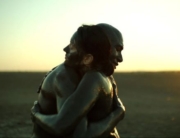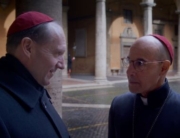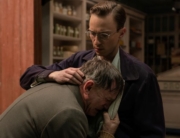Considering its esteemed cast, replete with Oscar and Emmy nominees and major franchise leads, director Greg Araki’s White Bird in a Blizzard is, quite simply, an embarrassment of riches—emphasis on “embarrassment.” Tedious, heavy-handed, exploitative, and unforgivably bland, the film misses its mark in nearly all aspects of its execution. With so much talent, it’s vexing that Araki could so thoroughly bungle and derail such a potentially magnetic project.
Based on Laura Kasischke’s 1999 novel, White Bird portrays an adolescent’s sexual self-discovery while coming to terms with the disappearance of her unstable homemaker mother. The exceptional Shailene Woodley grasps at straws to play Kat, a crass, sexually-fueled teenager who resents her June Cleaver of a mother, Eve (a miscast, weirdly ravenous Eva Green), even after Eve mysteriously departs from their late-’80s Douglas Sirkian household. Her unexplained vanishing is undermined by the preposterously indifferent reactions from her family and the surrounding community. Gone Girl this is not.
Christopher Meloni strives to deliver some heft to his role as Brock, Kat’s doormat of a father who lacks the gumption to search for his missing wife. And hopping along for the inept ride are a slew of formidable actors who are given little to do, including Gabourey Sidibe as Kat’s sassy lush of a best friend, Thomas Jane as an ineffectual detective, and a barely-there Angela Bassett as Kat’s pragmatic therapist. All of this wasted talent, along with several more incongruous performances from recognizable faces, such as Ugly Betty’s Mark Indelicato, Glee’s Jacob Artist, and Jericho’s Shiloh Fernandez as Kat’s dim-witted boyfriend, culminates in a narrative that encompasses painfully awkward exchanges to WTF-worthy reveals.
Viewers are treated to flimsy dream sequences, deficient delivery, jaw-dropping and hackneyed dialogue, uninspired voice-over narration, and unconvincing stagings of circumstances and emotions. Araki doesn’t seem to trust his audience to follow even the most basic of narrative devices, resolving instead to spell out the characters’ desires and actions before proceeding to visually depict them.
In one ridiculous scene, Jane’s Detective Scieziesciez utters to Kat, “I’ve seen a lot of bad shit… Trust me, you don’t want to know,” followed by, “One thing I’ve learned in all my years as a cop is that people are capable of doing horrible, unimaginable things.” (Does this movie count as one of them?) And after verbally declaring that he has been successfully seduced by Kat, the detective compliments her with, “Your tits are perfect.” Blech.
Speaking of breasts, I can’t help but recurrently return to the icky idea that Araki too often crosses the line of exploitative exposure, particularly with the uncovered performance of Woodley. The actress is patently comfortable with displaying her bare body on screen, a confidence that, in itself, is unquestionably commendable. But when the material rarely warrants the use of her nudity, the repeated display of Woodley’s breasts begins to feel like a misused accessory rather than an integral aspect of the storytelling.
Araki, who has previously submitted upending, exasperating, but regularly thought-provoking contributions to independent cinema—highlights include 2004’s Mysterious Skin and 2007’s Smiley Face—seems to be severely lacking the heady, considerate style of his earlier work. An overabundance of expletives, haltingly measured line deliveries, threadbare metaphors, and glaring red herrings are just a few of the misguided directorial choices that combine to create a discomfiting offering. Araki appears to have directed a film while distanced from its actors, sets, and script by a dense, impenetrable blizzard—and you can ponder that heavy-handed metaphor for free.







Leave A Comment